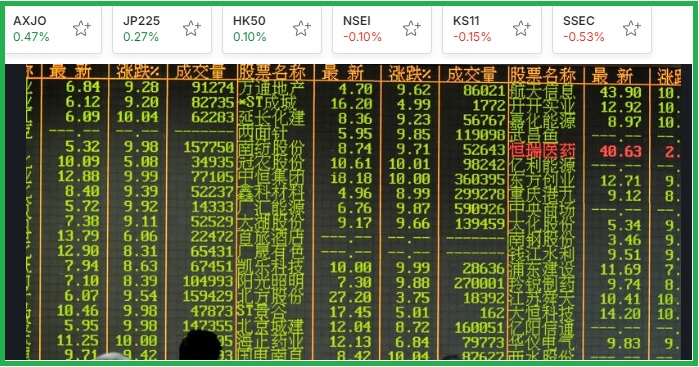
(Photo : Asian markets)
- Iran's missile strike on Israel has caused a shift in global markets, with investors favoring safer assets.
- The conflict has led to a decrease in U.S. Treasury bond yields, a surge in gold prices, and a strengthened dollar.
- The U.S. Federal Reserve's potential interest rate cut is being influenced by a resilient U.S. job market, affecting investor sentiment.
- The conflict's impact on global markets is reminiscent of similar historical events, underscoring the potential for significant market volatility.
The ballistic missile strike last night by Iran on Israel has sent shockwaves through global financial markets, prompting investors to seek safety amid rising geopolitical tensions. This shift has led to a notable decline in U.S. Treasury bond yields and a surge in gold prices, which are now approaching record highs. Meanwhile, the U.S. dollar has strengthened against the euro, reaching its strongest level in three weeks.
The missile strike, which took place on October 2, 2024, has also triggered a sharp reaction in the oil markets. Brent crude climbed over 1%, reaching $74.40 per barrel, as concerns over potential supply disruptions in the Middle East escalated.
Stock markets across Asia were not spared from the fallout. Japan's Nikkei fell 1.5%, South Korea's KOSPI dropped 1.3%, and Australia's benchmark index slipped 0.3%. In the U.S., futures for the S&P 500 were also down, signaling a growing risk-averse sentiment among global investors.
Impact on Central Banks and Economic Outlook
The ongoing geopolitical turmoil is likely to weigh heavily on central banks' policy decisions in the coming months. In the U.S., the Federal Reserve has been signaling a smaller interest rate cut for November, driven by the strength of the domestic job market. This could temper expectations for aggressive monetary easing, especially as data on job openings points to continued economic resilience.
Fed Chair Jerome Powell has pushed back against the notion of a significant rate cut, emphasizing the stability of the U.S. economy. Investors are now adjusting their expectations, anticipating a more cautious approach to monetary policy. This has led to a slight retreat from long positions on Treasury bonds as market participants look to economic indicators for further direction.
In Europe, the European Central Bank (ECB) is expected to implement a quarter-point rate cut in response to inflation falling below target levels. This move, designed to support the eurozone economy, is shaping market expectations and influencing bond yields, the dollar's strength, and overall investor confidence.
Historical Parallels and Market Reactions
The current geopolitical tensions are reminiscent of past conflicts that significantly impacted global markets. During the 1990-1991 Gulf War, oil prices spiked and stock markets plunged amid fears of a prolonged conflict and disruptions to oil supplies.
Similarly, the 2008 Russia-Georgia war briefly drove up oil prices and caused a dip in global equities. These historical events highlight the vulnerability of markets to geopolitical instability.
With the Middle East on edge and central banks poised to respond to global economic pressures, investors are bracing for further volatility in the weeks ahead. The evolving situation in Iran and Israel will continue to shape market sentiment and economic outlooks around the world.









